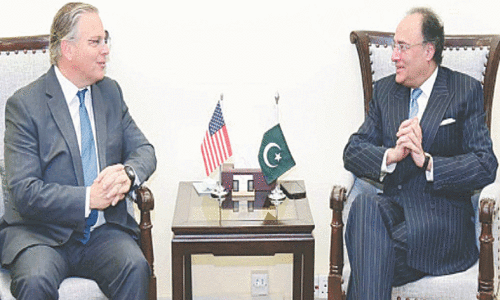ISLAMABAD, Dec 4: Transition to democracy or chaos will come out of the developments unfolding in Pakistan, according to the head of an American think tank.
Carl Gershman, president of the National Endowment for Democracy (NED), presented this assessment at a roundtable on the ‘critical’ situation arranged by the Centre for Civic Education here on Tuesday.
The NED is a private grant-making institution based in Washington. Its mission is to strengthen democratic institutions around the world.
Pakistan is in the spotlight of global democratic experience today because the outcome would have global impact, he said, observing that “there is an opportunity for democratic growth by virtue of the situation being created”.
Though he found the dynamics of the war on terror “not healthy for the development of democracy”, he saw “strong prospect” for democracy in the wake of the struggle of lawyers, students, journalists and teachers in Pakistan for rule of law and constitutionalism.
Mr Gershman said that political growth can only take place in culture of democracy.
Lt-Gen (retd) Talat Masood said that the military became “a very dominant institution” in Pakistan for historical, political, economic and geo-strategic reasons. It was very difficult for the military to get out of politics because democratic pillars like independent judiciary and strong and democratic political parties were missing, he added.
The retired general, who once headed the Pakistan Ordnance Factories, said that military dominance had been beneficial in some areas but detrimental to the growth of other state institutions. This situation was not in the interest of the military itself.
He said the NGOs, students and lawyers were struggling “to build a new Pakistan” and the coming elections provide the opportunity to realize this dream.
As a defence analyst he held the war on terror responsible for impeding democracy in Pakistan. Extremism and terrorism were the direct result of lack of democracy, he said, declaring that “no war can be won without the support of people”.
Dr Inayatullah, President, Council of Social Sciences, said that suppression of political parties and political leaders over decades had weakened the democratic culture in the country.
Politicians faced exile and execution and the most brilliant of them was hanged, he reminded.
Athar Minallah, a leader of the lawyers’ movement, said an independent judiciary is essential to bring stable democracy to Pakistan which was created as a welfare state but converted into a security state.
“As long as there is no independent judiciary, elections will be a farce and will be rigged,” he declared.
Mazhar Abbas, Secretary General of Pakistan Federal Union of Journalists (PFUJ), said that in Pakistan both elected and unelected regimes put pressures on media. The print media was responsible for exposing corruption of democratic, non-democratic governments alike.
Journalists in Pakistan have paid a heavy price for writing the truth, he said informing the roundtable that 25 journalists have been killed in the line of duty and in the country. In the case of Hayatullah Khan his entire family has been targeted as his brother and wife were murdered.
Since the imposition of emergency rule the media was under constant pressure and TV channels on air today were under the complete control of the government, he said.
Similarly editorial content is under scrutiny and PFUJ has been implicated in a case on the pretext that an anti-military pamphlet was distributed by a civil society organization at a PFUJ protest camp.
Zafarullah Khan, executive director of the CCE-Pakistan, said that “undiluted democracy and rule of law are the only ways forward”.
He said the chances for democracy were great as “people are yearning for it” and recalled that all military rulers finally had to revert to “some form of democracy”.
Prof Khwaja Masud, Mehboob Sada, Aniq Zafar and others also spoke on the occasion.
Brian Joseph, NED director for Asia, was also present on the occasion.














































Dear visitor, the comments section is undergoing an overhaul and will return soon.